Share
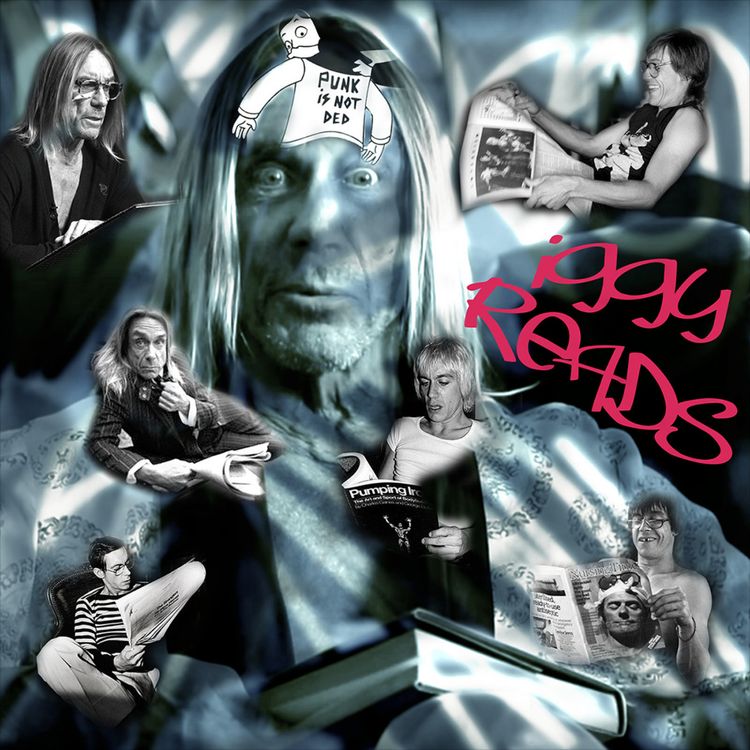
The Napping Wizard Sessions
Tribute: Iggy Reads
This is a listening show. In a traditional radio format, I collect recordings where Iggy Pop reads from books. Sit back and let Iggy tell you a story or send you to sleep.
CLIP LIST (in order of appearance)
01. (clip Persepolis, Marjane Satrapi and Vincent Paronnaud, 2007)
02. (clip: Leaves of Grass, Walt Whitman, recording from EP, Leaves of Grass, 2016, with Alva Noto and Tarwater)
03. (clip: “Good Evening,” excerpt from fundraising promo for film, The Sandman, with Dario Argento, 2014)
04. A Machine for loving, Michel Holleoubecq, recording from Préliminaires, 2009, with Hal Cragin
05. From Pent Up Aching Rivers, Walt Whitman, recording from EP, Leaves of Grass, 2016, with Alva Noto and Tarwater
06. The Tell-Tale Heart, Edgar Allan Poe, recording from Closed On Account Of Rabies, produced by Hal Wilner, 2007
07. A reading from the bible as Salvatore “Sally” Jenko, recording from Jim Jarmusch film Dead Man, 1995
08. Persepolis, Marjane Satrapi and Vincent Paronnaud, 2007
09. Repo Man, lyric to film theme song, recording from Rizzoli Bookstore by Jeff Slate, 2016, at the release of Jeff Gold’s book Total Chaos, The Story of the Stooges.
10. We Are The People, Lou Reed (1971), recording from Free, 2019, with Leron Thomas
11. (excerpt, Do Not Go Gentle Into That Good Night, recording from Free, 2019, with Noveller)
12. The Dawn, recording from Free, 2019, with Noveller (aka Sarah Lipstate)
13. (clip: American Valhalla, recording from Post Pop Depression, 2018, with Joshua Homme)
14. (clip: Les Feuilles Mortes, Jacques Prevert and Joseph Kosma, recording from Préliminaires, 2009, with Hal Cragin)
15. (clip Persepolis, Marjane Satrapi and Vincent Paronnaud, 2007)
More episodes
View all episodes

4. Conversation: Gloria Origgi
52:14||Season 5, Ep. 4In this conversation, recorded on March 16, 2024, which is a follow-up to my previous podcast, philosopher Gloria Origgi elaborates the ideas in her book, Reputation: What it is and Why it Matters. In Part 1, I played her lecture on that subject from the Night of Philosophy 2019. Here we discuss the ideas and specific cases since that time in which reputation impacts our global lives.Gloria Origgi is an Italian philosopher and social scientist based in Paris at the Institut Nicod, Ecole Normale Supérieure. In her research work, she tries to understand the impact of social relations and institutions on knowledge processes. She has worked extensively on the evaluation of knowledge and science. She has been a member of two advisory boards at the European Commission in Brussels (Future and Emerging Technologies and Gender) whose aim is to design the new Research Framework Program after Horizon 2020.She has taught in France, Italy, Brazil, and is regularly invited in many institutions in United States, UK and Germany. In 2005 and 2013 she was Visiting Fellow at the Italian Academy for Advanced Studies at Columbia University. She also works on ethics of science, the epistemology of gender and its applications to social cognition. She was an invited Professor in Germany (University of Bielefeld - Center of Excellence for Cognitive Interaction) and in Munich in 2021.In addition to La réputation, qui dit quoi de qui (Presses Universitaires de France, 2015) and its translation, Reputation: What it is and Why it Matters? (Princeton University Press, 2018); in 2019 she published a Dictionary of Social Passions (PUF) which gathers more than 140 colleagues from French universities and international institutions to understand the role of passions in human motivation. Her last book, La vérité est une question politique (Albin Michel) was published in 2024. Since 2016, she has participated in a new joint EHESS-Columbia University-Dakar University project on the Epistemologies of the South. She is also involved in research on Epistemic Democracy. Her research work has been covered by many newspapers and media such as The Financial Times, The Guardian, Le Monde, BBC, France Culture.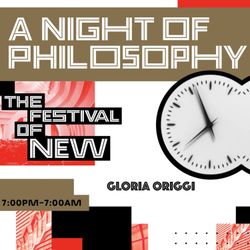
3. NoP: On Reputation
21:37||Season 5, Ep. 3In 2019, I was invited to participate in the Night of the Philosophy at the New School for Social Research to record and then make art with the various lectures I attended from 7pm-7am. I posted some of these already, but since that night, one lecture I never got to always stuck with me. It’s on Reputation by Gloria Origgi, a philosopher who works in the interdisciplinary fields of social epistemology and experimental philosophy. In these five years since that midnight event, reputation as a philosophical, social, and political subject has only grown in relevance to our lives. Here I play the lecture from 2019. In Part 2, I have a conversation with Gloria where she elaborates on the ideas she introduces and from her book, Reputation: What it is and Why it Matters. We discuss pertinent ways and specific cases of how reputation manifests in our global lives.Gloria Origgi is an Italian philosopher and social scientist based in Paris at the Institut Nicod, Ecole Normale Supérieure. In her research work, she tries to understand the impact of social relations and institutions on knowledge processes. She has worked extensively on the evaluation of knowledge and science. She has been a member of two advisory boards at the European Commission in Brussels (Future and Emerging Technologies and Gender) whose aim is to design the new Research Framework Program after Horizon 2020.She has taught in France, Italy, Brazil, and is regularly invited in many institutions in United States, UK and Germany. In 2005 and 2013 she was Visiting Fellow at the Italian Academy for Advanced Studies at Columbia University. She also works on ethics of science, the epistemology of gender and its applications to social cognition. She was an invited Professor in Germany (University of Bielefeld - Center of Excellence for Cognitive Interaction) and in Munich in 2021.In addition to La réputation, qui dit quoi de qui (Presses Universitaires de France, 2015) and its translation, Reputation: What it is and Why it Matters? (Princeton University Press, 2018); in 2019 she published a Dictionary of Social Passions (PUF) which gathers more than 140 colleagues from French universities and international institutions to understand the role of passions in human motivation. Her last book, La vérité est une question politique (Albin Michel) was published in 2024. Since 2016, she has participated in a new joint EHESS-Columbia University-Dakar University project on the Epistemologies of the South. She is also involved in research on Epistemic Democracy. Her research work has been covered by many newspapers and media such as The Financial Times, The Guardian, Le Monde, BBC, France Culture.
2. Interview: Erwan Maheo
01:09:49||Season 5, Ep. 2In this conversation, I speak with Brussels-based artist Erwan Mahéo. The conversation took place on May 25, 2023, as we were setting up a project in and around La Sirene de Belle-ile in France.Erwan Mahéo's art practice moves freely between the categories of sculpture, painting, video, photography, collage, ceramics, and textiles but finds its home in eclectic mixes of genre-fluid forms, ideas, and expressions. In 2023 Bruxelles: La Lettre volèe published a monograph of his work titled Histoires et Gèographies. And in the past decade his work has shifted into comprehensive projects that create spaces where things can happen, inviting artists to create work in deeply entrenched historical and geographic sites.You can explore his work on Instagram @erwan_maheoErwan's work has been presented in various institutions : La Grandeur Inconnue, Domaine de Kerguéhennec (F.1993) ; Laboratorium, Antwerpen Open (1999) ; Nameless Swirls, an Unfolding in Presence, Van Abbemuseum (Nl. 2003) ; Mathématiques, Fri-Art, Fribourg (Ch. 2004) ; Track, Gent (2012) ; Novelty Ltd. Fondation d’entreprise Hermès, La Verrière, Brussels (2017) and in galleries : Unknown Places, Tim Van Laere gallery, Antwerp (2005) ; Dispersion, Galerie Catherine Bastide, Brussels (2008) ; La Grande Image, Galerie Vidal Cuglietta, Brussels (2011), among many others.He is on the faculty at La Cambre School of Visual Art in Brussels where he heads the Department of Urban Space.Between 2003 and 2012 he founded and directed an Artist in Residence program called Le Centre du Monde on the island of Belle-ile-en-Mer (F). The collection which grew from this project was given to the FRAC Bretagne in 2014. The book Le Centre du Monde (Description of an invisible sculpture) was published on this occasion. Between 2013 and 2019 he co-founded and co-directed the editorial project Herman Byrd (with Sébastien Reuzé). In 2023 he founded the project La Sirene de Belle-Ile.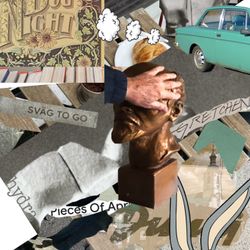
1. Interview: Gretchen Frances Bennett
01:03:32||Season 5, Ep. 1In this Napping Wizard Session, I met up with Seattle-based artist Gretchen Frances Bennett in Bratislava Slovakia on 12 June 2023. In 2021-2022 she completed a Fulbright Core Scholar research grant to retrace a family trip she made to the city in the 1970s. Time travel, memory, family archives, we circle a literary work she has in progress that stretches the then and now of impressions she has from various trips to a Central Europe that changed so much between 1972 and 2023.As this conversation demonstrates, Gretchen’s work explores the soup of recounted personal histories, the fluidity of memory, and the construction of new literary, visual, and audio stories that imagine themselves in the openings between historical facts and personal memories.In NYC, Gretchen has participated in artist-in-residence programs on Governors Island with the Lower Manhattan Cultural Council, the Bronx Museum of Art and has created a public program with the Drawing Center. The Frye Art Museum and the Seattle Art Museum, among many others, have hosted exhibitions of her work over the years. Her writing has appeared in Cold Cube Press for Veronica Project Space, Seattle, WA; in Earth Saga Press, Letters from Earth, Glasgow, United Kingdom; and in La Norda Specialo, Seattle, WA. She has also been an adjunct faculty member at Seattle University, Department of Art, Art History, and Design for many years. More info can be found here: https://www.gretchenbennett.com/ In the podcast I promise to link to a playlist. This is Gretchen’s soundtrack and hallucinogenic audio mood board of the then-communist Czechoslovakia she visited in 1972-73. All the songs we reference can be found here. Listen along, or follow the podcast with this nostalgic soundtrack. Gretchen’s Spotify Playlist: 72 / 73If Loving You is Wrong, I Don’t Want to be Right, LUTHER INGRAMBaby, Baby, I’m Hooked on You, MAC DAVISAin’t No Sunshine When She’s Gone, BILL WITHERSYou’re so Vain, CARLY SIMONLean On Me, BILL WITHERSMe and Mrs. Jones, BILLY PAULTHE WEST WING, The Lame Duck Congress, Season 2.6, Aaron Sorkin and John Wells, ©Warner Bros.LOONEY TUNES, Bugs Bunny and Yosemite Sam, (Cross This Line) Chuck Jones and Friz Feleng, ©Warner Bros.FLIPPER, Ivan Tors Films in association with Metro-Goldwyn-Mayer TelevisionFINNEGANS WAKE read by Patrick Horgan, 1985, Book II, Episode I
7. Jaws Live Action YMCA
03:42||Season 4, Ep. 7
6. Interview: Farideh Sakhaeifar
01:19:37||Season 4, Ep. 6On April 02, 2021 I spoke with Farideh Sakhaeifar about her exhibition You are in the War Zone at Trotter and Sholer in New York’s Lower East Side and her residency at Koda Lab in Brooklyn. The presentations introduce several of her visual experiments from the last decade as a kind of survey. Her work explores various themes from the Middle East and her native Iran, and the differences and complexities of living in the United States since 2009. How does the media influence the way we see our position in the world? Having known Farideh since 2013, I take cues from the exhibition as opportunities to go off script into the past and future of her work and how she has handled the remarkable year that 2020 has been. Audio excerpts from Halabja, 1988, with sound design by Sadra Shahab and narration by Maryam Ghoreishiand vocal excerpt by Hussein Smko from the Hekler event The People’s Tribunal.You are in the War Zone was organized jointly by Trotter and Sholer: https://trotterandsholer.com/exhibition/you-are-in-the-war-zone/and Koda Lab: https://www.kodalab.org/with contributions and collaborations from Hekler: https://www.hekler.org/Details about Farideh and her work can also be found here: https://faridehsakhaeifar.com/I recommend you browse the website as we discuss the work and follow along with the images of the titles we introduce.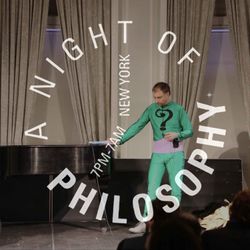
5. NoP: Leshonkii
27:27||Season 4, Ep. 5The following is a transcript from a lecture I delivered at A Night of Philosophy, a free event that hosted 62 international philosophers and 12 artists on April 24, 2015 from 7pm to 7am simultaneously at the French Embassy and The Ukrainian Institute on New York City’s Upper East Side. I was invited as an artist, and I chose the subject of the shape-shifting character Leshonkii, of Ukrainian, Russian and Slavic folklore, to adapt to the site of the Ukrainian Institute. As an artist, the logical shape to shift into was that of a philosopher. I delivered my lecture in a crowded auditorium on The Philosophy of the Comic and Tickling at 03:50 am. I have no audio or video documentation of the event, so this is a post-performance presentation. The laugh tracks and supplemental audio was included in the live performance.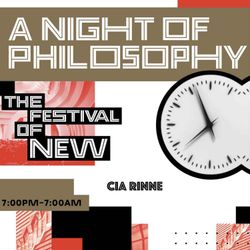
4. NoP: The Usage of Words
25:16||Season 4, Ep. 4In this reading from The Night of Philosophy in 2019 on October 06 at 03:00 am at the New School for Social Research in New York City, Cia Rinne was listed on the program with a presentation titled softly The Usage of Words. Listening to Cia Rinne’s poems is like channel flipping through international TV stations with the desire to reduce the mass of verbal waste by limiting each channel to just a single word. But infinity is infinity no matter the limits you put on how much fun you’re having with it. Minimalism pretends to seek silence, but it accumulates too much joy along the way. Cia Rinne is a multi-lingual Swedish-born poet and artist based in Berlin. Her publications include zaroum, notes for soloists and l’usage du mot. For 6 years she documented the lives of Roma communities in Hungary, India, Greece, Romania, France, Russia and Finland while she collaborated on a book titled, “The Roma Journeys.” Her visual, literary and acoustic works have been included in various international exhibitions. More can be found below:http://writing.upenn.edu/pennsound/x/Rinne.phpSamples from: Steve Reich, Different Trains, Electric Counterpoint – 3. After The War; Samuel Becket from Aspen 5&6; and Cia Rinne from Notes for Soloists with sound design by Sebastian Eskildsen, 2011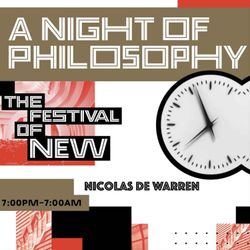
3. NoP: Onkalo or the Contamination of Eternity
46:23||Season 4, Ep. 3In this lecture from The Night of Philosophy in 2019 at 05:00 am on October 06 at the New School for Social Research in New York City, Associate Professor of Philosophy, Nicolas de Warren, discusses our debt of plastic and nuclear waste. While many of us dream about augmented technology and the possibility of becoming cyborgs in the future, Dr. de Warren considers a different transformation of homo sapiens. With the prevalence, distribution and breakdown of plastics and nuclear waste into micro and nanoparticles, it is likely that we will consume so much as a species that future homo sapiens will indeed become part organic and part something else. Our waste habits produce an uncontrolled Kippleization – a term de Warren borrows from Philip K. Dick – that is guaranteed to transform the bodies of humans 100,000 years in the future. That is close to twice as long as homo sapiens have roamed the earth. The pyramids in Egypt are much younger than that, and yet the lazy gift we will saddle our descendants with will be far more cursed than the tombs of the pharaohs. In another Sci-Fi nod, this time to the Strugatsky brothers, de Warren compares us to disrespectful roadside picnickers - we have not taken from the forest everything that we brought in. Our campsite remains a mess.Nicolas de Warren is Associate Professor of Philosophy at Penn State University. He has published extensively on phenomenological subjects such as Original Forgiveness, Husserl’s Awakening to Speech, Emmanuel Levinas and the Evil of Being, Sartre’s Phenomenology of Dreaming and Towards a Phenomenological Analysis of Virtual Fictions.